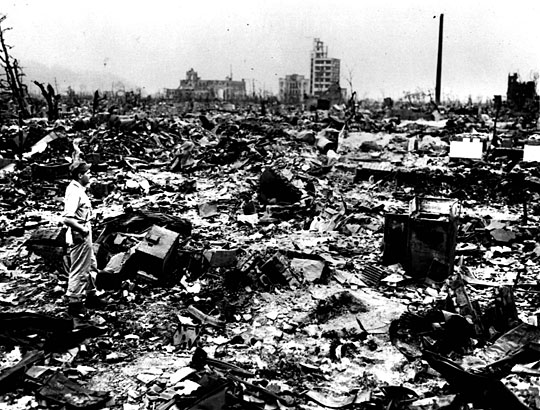Although it was an unthinkable and undeserved outcome to the thousands of individuals who were killed by the atomic bomb -- in that sense not all that different than the deaths of millions of other civilians during the Second World War -- August 6 had a beneficial outcome for humanity. The bombing of Hiroshima directly led to the surrender of Imperial Japan on August 15, 1945.
This is from USA Today's account of the anniversary:
HIROSHIMA, Japan — Japan marked the 70th anniversary of the atomic bombing ofHiroshima on Thursday, as its mayor renewed calls for global leaders to rid the world of nuclear weapons, calling them "the absolute evil and ultimate inhumanity." ... An estimated 140,000 people died from the Hiroshima bombing, and even more were killed three days later in the attack onNagasaki , on Aug. 9.
It is certainly appropriate the include the best estimate we have of the people killed in the Hiroshima bombing. However, what also needs to be included -- but never is -- is the best estimate we have of the number of people who would have died had WW2 continued on its course.
Those "saved" by the Hiroshima and Nagasaki atomic bombings were not just the tens of thousands of American and Allied military who would have died in an invasion. The U.S. estimated at the time we would have suffered 1 million casualties, though certainly not all of those would have been killed. The "saved" also include millions of Japanese civilians and soldiers we would have killed during an invasion and more who likely would have died from starvation and disease.
But only considering the American and Japanese lives that were saved by the A-bombs woefully underestimates the total. Japan was still viciously in charge of Korea, large parts of China, Vietnam and Indochina and other territories in the Pacific in August, 1945. Had the War continued, it seems reasonable to presume that millions of civilians who survived following the War in those places would have died had the Japanese not surrendered due to the attacks on Hiroshima and Nagasaki. Thousands in those places every day were dying of disease and malnutrition due to the savage occupation by the Japanese. Virtually every country near Japan to this day hates Japan because of how horribly the Japanese occupiers treated their countries during the War.
Another important consideration of the benefit of ending the War as quickly as we did with the atomic bombings is the role of Soviet Russia in Japan. Other than the capture of a few islands in northern Japan, the Russians were left out of the occupation and reintegration of post-War Japan. But if they had played a role in the invasion, then it is likely (as happened in East Germany and North Korea) that the Russians would have imposed a Communist regime on the part of Japan it controlled. Because that never happened, Asia has been much more stable and prosperous ever since. And there are literally tens of millions of Japanese who have enjoyed good lives ever since who, under Communism, would have suffered the terrible fate of the North Koreans.
Another important consideration of the benefit of ending the War as quickly as we did with the atomic bombings is the role of Soviet Russia in Japan. Other than the capture of a few islands in northern Japan, the Russians were left out of the occupation and reintegration of post-War Japan. But if they had played a role in the invasion, then it is likely (as happened in East Germany and North Korea) that the Russians would have imposed a Communist regime on the part of Japan it controlled. Because that never happened, Asia has been much more stable and prosperous ever since. And there are literally tens of millions of Japanese who have enjoyed good lives ever since who, under Communism, would have suffered the terrible fate of the North Koreans.
Certainly, the bombings were an injustice for the innocents in Hiroshima and Nagasaki who suffered terrible deaths -- some taking years of agony. But given the choice of a few hundred thousand versus many millions, it is clear to me that President Truman's decision to drop the bomb was the most humane one he could have made.


No comments:
Post a Comment